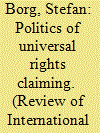| Srl | Item |
| 1 |
ID:
169056


|
|
|
|
|
| Summary/Abstract |
How can we study the politics of human rights activism in violent social conflicts? International Relations scholarship has long neglected the ambiguous political relationships between human rights activism and violent social conflicts. Addressing this gap requires new research methodologies that place the focus not on the normative or legal dimensions of human rights, but in how their usage constitutes the political. In this article I argue that using post-foundational discourse theory makes visible ‘politics-as-ruptures’ that locate the political function of human rights activism precisely in the resistance to representations of violence in conflict discourses. I analyse this political function by asking how activists translate human rights norms, transform conflict discourses, and thereby contest power relations. As examples, the article presents three types of discursive politics that I studied in Colombia. These examples point out further pathways to pose empirical questions about the roles of human rights activism in transforming social conflicts.
|
|
|
|
|
|
|
|
|
|
|
|
|
|
|
|
| 2 |
ID:
189911


|
|
|
|
|
| Summary/Abstract |
This article explores how disruptive political conflicts evolve in peace processes by studying Colombian human rights defenders’ discourses about the peace process with the FARC-EP. While post-conflict scholarship has predominantly discussed violence and societal frictions as caused by legacies of war or flawed peace governance, I focus on the confrontations over political imaginaries that are endemic to peace processes. Through the lens of post-foundational discourse theory, I read the peace process as hegemonic crisis. This allows me to unpack the entanglement of political change and conflict, to which my discussions with human rights defenders allude: On the one hand, the peace agreement opened a political moment, in which it seemed possible to leave behind the hitherto hegemonic imaginary of the conflict as terrorism that had protracted the ‘state of war’; the advocacy for peace with social justice, on the other hand, it restaged historical confrontations with elites of the political right as antagonistic conflict over the meaning of peace. My analysis not only challenges the paradigm of war-to-peace transition, but also defines discursive conditions under which disruptive conflicts turn a peace process into an enduring interregnum, where the dawn of the post-conflict epoch is perpetually deferred and activist lives are threatened.
|
|
|
|
|
|
|
|
|
|
|
|
|
|
|
|
| 3 |
ID:
153256


|
|
|
|
|
| Summary/Abstract |
This article contributes to a theoretical understanding of rights claiming as a specific form of political practice. The article develops and defends a post-foundationalist understanding of rights discourse as a way of making a claim to social change through appealing to a universal and illustrates such an understanding with the contestation over women’s rights in post-revolutionary Tunisia. To develop this argument, the article draws on Jacques Rancière’s notion of political subjectification and Ernesto Laclau’s engagement with the relation between the universal and the particular. To examine the relevance of such conceptualisation, the article turns to the struggle over women’s rights in post-revolutionary Tunisia, where secular and sacred understandings of the universal have been invoked frequently through rights discourse. In this context it is shown that claims to the universal give rhetorical force to rights discourse, and instead of depoliticising social relations, which rights discourse is often charged with, such claims are vital for political efficacy. However, whereas Laclau’s position helps us to understand rights as a language of resistance, a more robust defence of the universal is needed to defend rights in terms of emancipatory political change. To pursue this argument, the article turns to Rancière’s defence of axiomatic equality.
|
|
|
|
|
|
|
|
|
|
|
|
|
|
|
|